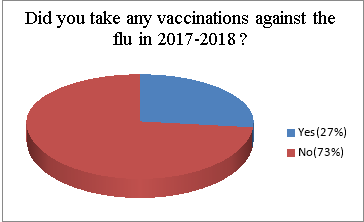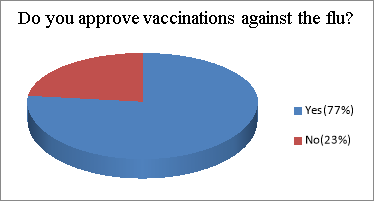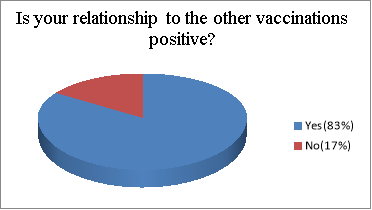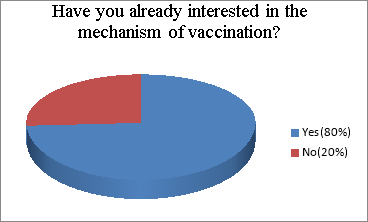The aims of the project were:
1) to explore the mechanism of vaccination;
2) to find out the relevance of the problem of inoculation;
3) to run a survey to see what the Russians think about vaccination.
Novelty of the study: Nowadays more and more parents decide not to vaccinate their children against measles and other infectious diseases. People are not sure what is better: to have vaccinations or not to.
What does the law say?
There is an official law of the federal importance in Russia. It is called “On prophylaxis of infectious diseases” (17th of September, 1998)
The fifth article says that citizens have a right:
– to get a free medical examination before having a vaccination.
– to get social protection in case of disorders after inoculation.
– to refuse from vaccination.
What is the National calendar of preventive vaccinations?
The National calendar of preventive vaccinations is a number of set dates and types of vaccinations to be carried out in children and adults, taking into account the epidemiological situation in the country, as well as the age distribution and severity of the illness, respectively [5]. In Russia this document is issued by the Ministry of Health.
Many countries have similar calendar, though their aspects may differ. For example, the USA calendar includes more vaccinations than the Russian one.
For many years there has been an opinion in Russia that the most effective way to avoid the development of an infectious diseases is to vaccinate citizens. [5, p.14]. As today some people prefer to avoid immunizations, there can be different ways for our organism to have the persistent and strong immunity to the illnesses.
On the one hand, a person may get sick and then get over. After this begins a production of protective factors (they are called antibodies) which will be helpful for the health in the future. They prevent a person from being sick again, but only with the same disease. It seems to be the most dangerous way because it is unpredictable, and every person can have different complications while recovering.
On the other hand, people can choose vaccination. In this case they have an injection. Weak microorganisms, components of the viruses are introduced with the help of the syringe. This invasion causes in the organism the immune reaction (antibodies are also produced) [3].
The principle relates to the development of the artificial immunity for special pathologic microorganisms. The aim is to get the immunity and to protect our body from this disease in future. As a result, people do not have a real illness, but they already have protection in case of infection.
The problem of vaccination refusal is very relevant in Russia and all over the world today. World Health organization named vaccination refusal among the risks to population health. A lot of parents think that the risks outweigh the advantages and do not vaccinate their children.
A survey was performed to know what people of different ages and professions think about vaccinations. There were 30 people (12 men and 18 women) who participated in the survey. Additionally, it was done among such people as
– People aged 18–25 (medical and non-medical students)
– People aged 26–55 (men and women with higher education)
The results of the survey
– The figures show that most people did not take the vaccination in 2017–2018. But those who did vaccinations were mainly young students, and additionally emergency workers and lawyers (only men). There were no women who had vaccinations against the flu. To sum up, almost all people aged 18–25 did vaccinations when other respondents avoid taking them.
– What is more, most of the answerers approve doing other types of vaccinations because there are only three people who do not prefer taking them. Additionally, it was found that there were two girls from different universities who have very different thoughts about immunization. One is from medical university and she not only approves vaccinations but also actively promotes doing them. But the other one avoids doing vaccinations at all although she was really interested in the mechanism of vaccine’s effect.
– People mostly approve immunization. Almost 80 % of the answerers were not against vaccinations, even in case of flu. But the most interesting thing is that people who approved vaccinations did not have them last years.
– More than 90 % of participants are really interested in vaccinations (not only medical students, but also people whose work is connected with humanitarian work). To sum up, this statistic confirms the novelty of this problem.

Fig.1. The results of the survey 1.

Fig.2. The results of the survey 2.

Fig.3. The results of the survey 3.

Fig.4. The results of the survey 4.
There also were some interesting commentaries on the problem during the survey:
–“I am allergic so it is difficult for me to carry over some vaccinations”(34-year-old woman, lawyer)
–“I am afraid of complications” (53-year-old woman, bookkeeper)
–“To improve my immunity, I am doing sports and drink vitamin complexes” (26-old man, lawyer)
–“Unfortunately, it is not convenient for me to do vaccinations” (28-year-old man, attorney)
–“I do not have vaccinations (particularly against the flu) because they negatively influence my chronic illnesses” (18-year-old girl, student)
As views differ a lot, it would be better to show the main advantages and disadvantages of vaccinations.
Table 1
For and against vaccinations
|
Reasons FOR vaccinations |
Arguments AGAINST vaccinations |
|
Social limitations (like isolation): Rejection for people to visit special countries and even places without having vaccinations [4, p. 18]. |
“VAERS-Vaccine Adverse Event Reporting System” [6] in the USA registers a lot of cases when people have serious complications after the vaccination. |
|
Some scaring facts about the vaccinations are not reliable and this information sometimes does not have the confirmation. |
VAERS confirms: deaths after vaccinations against chin cough happen more frequently than deaths because of this disease. Such immunizations can be a cause of the Sudden Infant Death Syndrome — SIDS- serious infant disorder [4, p. 15]. |
|
In countries where there is the best index of living, the system of vaccination is developed and widely spread out. |
Comprehensive research of the Dr. Bart Classen all over the world showed that vaccinations could be a cause of diabetes [4, p.16] (children are under the risk) |
|
In twenties century, in 1918–1920 years the flu pandemic took away 40 million of lives, when 500 million of sufferers were ill. This is much bigger than lost people in the First World War. |
Even nowadays when scientists can create amazing vaccines, there are some doubts about their quality and influence on people [1]. |
Conclusion:
The effects after immunization are better than complications after the disease, so the best recommendation is to HAVE vaccination than to have serious disease with unpredictable end.
Prophylaxis among children and adults is useful and reliable.
In my point of view, every person has his own position and it would be better for everyone to make decisions themselves. But, in my opinion, people should have vaccinations and follow the National calendar of preventive vaccinations because mostly it presents vaccinations against severe illnesses and refusal from them will be very risky for our health. With the help of vaccines, you will be ready to beat all the illnesses and avoid catching an infection. What is more, it is very important to pay attention to our health, keep feet and every immunization will be only an additional, but useful thing which will help our immunity.
References:
- Gordon A. Vaccines and vaccination. Review / A. Gordon // Internatinal medical journal. — 1998. — № 1/ 2002. — P. 54–61.
- Blinkin S. A. Vaccines protect / S. A. Blinkin. — Мoscow: Medicine, 2013.— 287p.
- Fyedorova E. A. Vaccinations. Terms, reactions, recommendations / E.A.
- Fyedorova. — Мoscow: АСТ, Astrel, 2015. — 128 p.
- https://nsportal.ru/npo-spo/estestvennye-nauki/library/2016/11/29/statya-vaktsinatsiya-za-i-protiv
- https://iliveok.com/health/calendar-preventive-vaccinations_113387i16109.html
- https://vaers.hhs.gov/

